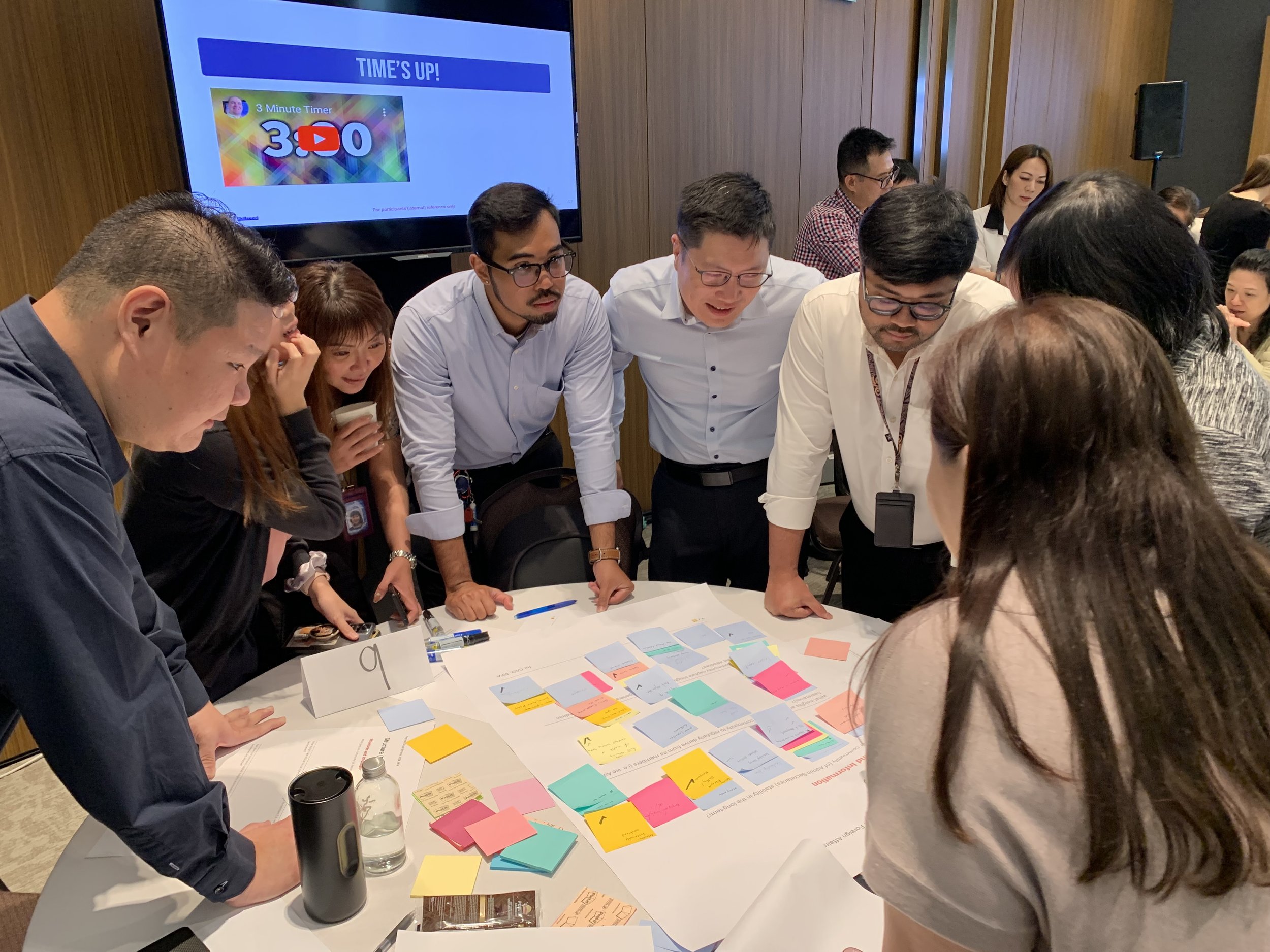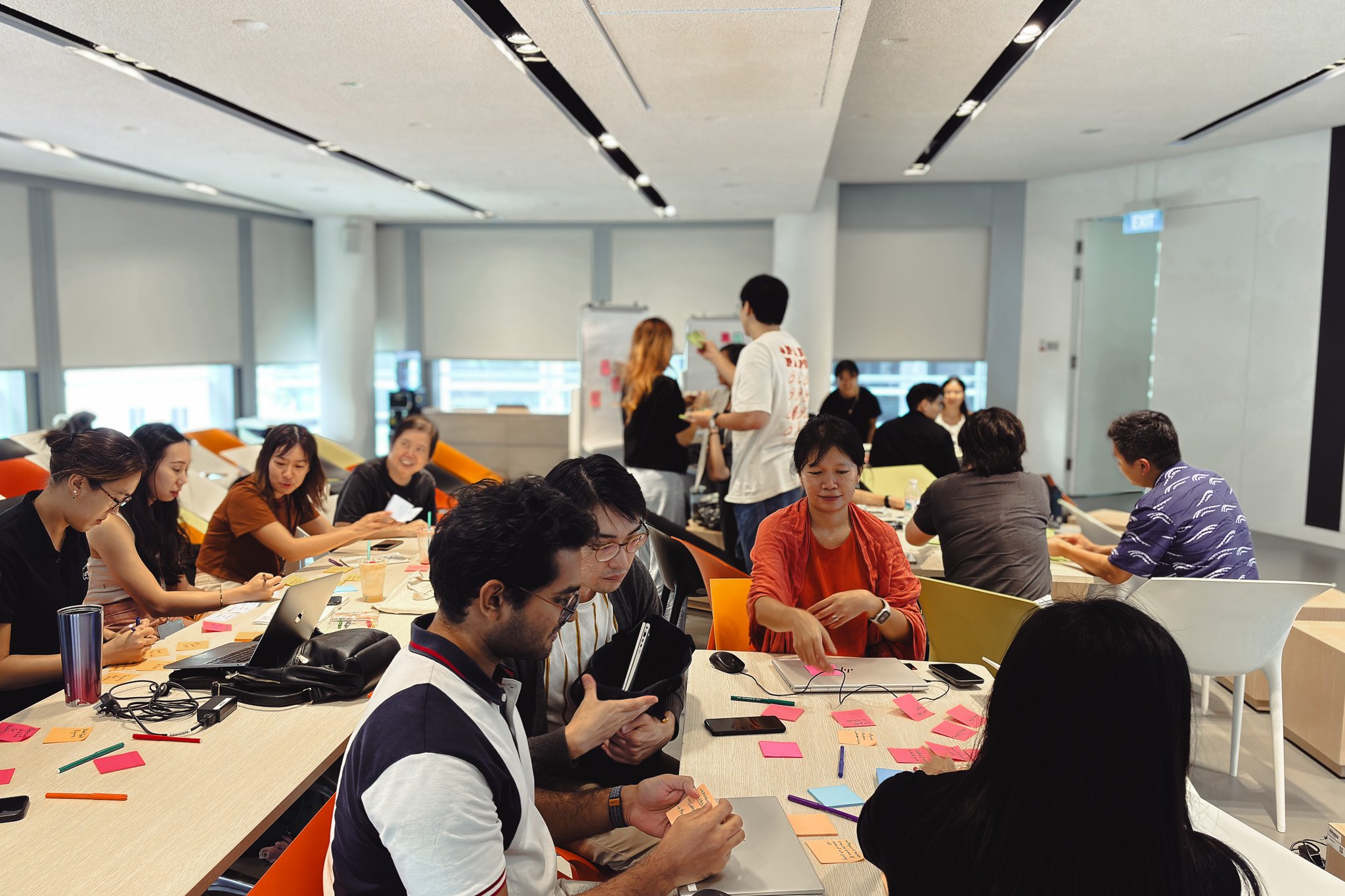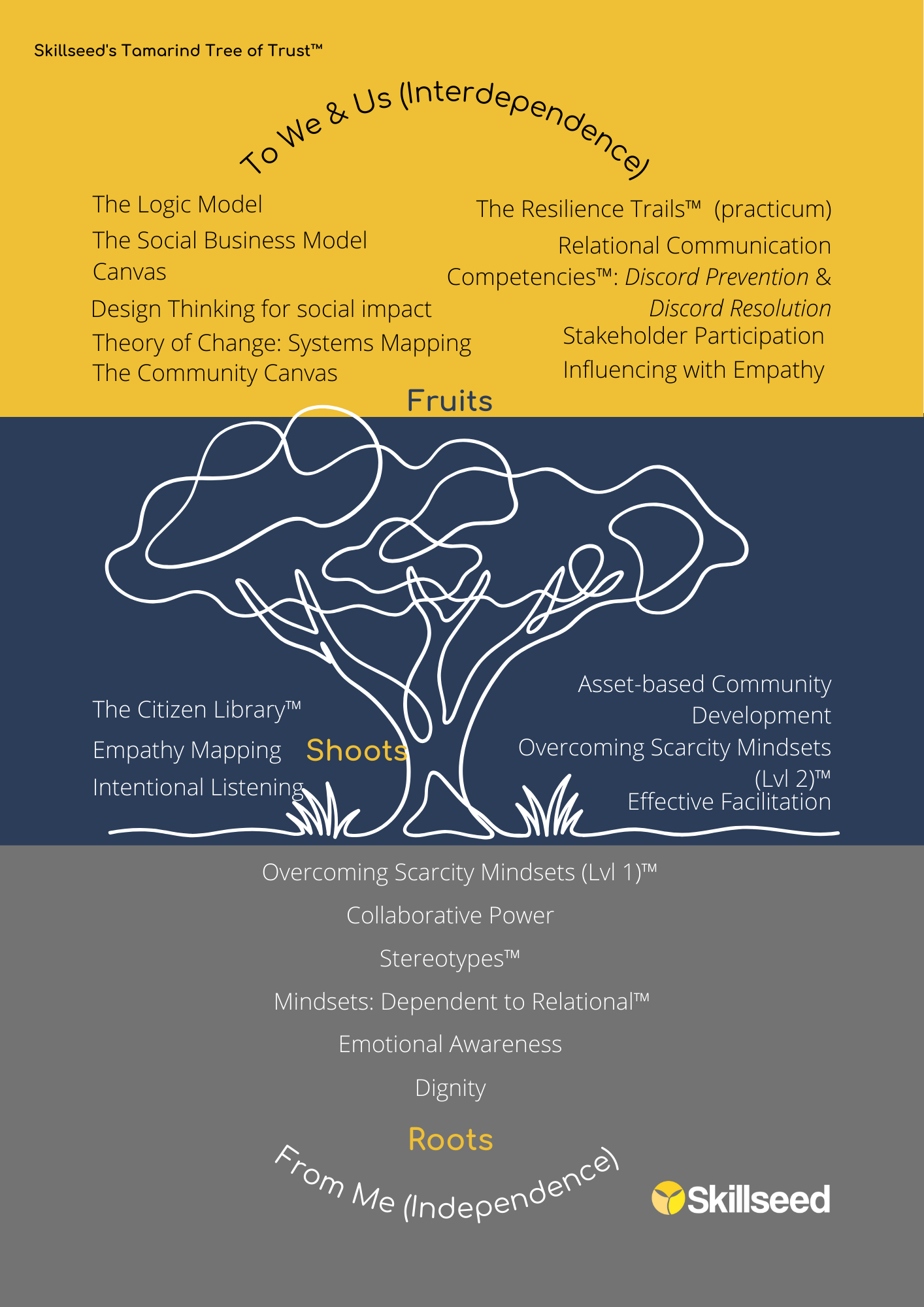
TRAINING
Equipping leaders across all sectors and levels
Become more impactful, relational, and ultimately trusted in your capacities and communities, no matter what sector you’re from.
The Foundational Concept
A Tamarind Tree of Trust™
The Nature of Trust
Trust is an essential yet often invisible force that underpins healthy relationships, resilient societies, and effective governance. We posit that a shift from basic, transactional forms of trust to deep Relational Trust, built on dignity, authenticity, empathy, relationality and a strength-based approach is critical in our current environment.
Through the metaphor of a Tamarind Tree, we present the means to cultivate relational trust as a living, layered structure—with Roots (mindsets), Shoots (engagement approaches), and Fruits (collaborative modes).
Through this framework, we aim to nurture more relationship-fueled growth by equipping communities with practical tools to bridge divides and co-create solutions, and ultimately, regenerate our communities and citizenry.
-
We envisage Relational Trust as a tree. A living structure that spans vertical, horizontal and temporal dimensions, unlocking all the other aspects of community building and partnerships. A tree that first has its roots deeply anchored in the ground, providing a sound foundation, before its crown extends outwards in connection with others.
Here is our model that integrates the mentioned Relational Trust drivers and more with partnerships and community engagement concepts.

Roots
Building foundations
Highly recommended for team building and bonding in any workplace, CSR programmes, volunteer training, service learning projects or foundational stakeholder (internal or external) engagement training.
-
1.5 hours
Emotional Awareness is fundamental to effective self leadership, and to building emotional resilience and hence sustainable relationships. In this module, participants will learn and practise fundamental skills for developing Emotional Awareness.
Through the Thoughts-Feelings-Actions (TFA) framework, participants will better understand the relationships between the different components by reflecting on their lived experiences. By being more aware of the patterns in their thoughts and feelings, one can choose how to respond instead of reacting emotionally. Using TFA in reverse also serves as an empathy tool which helps participants to respond more empathetically. -
2.5 hours
Dignity is defined as a person’s inherent worth that they are born with, regardless of their background, behaviour, beliefs, social status, credentials and so forth.
This module introduces the concepts of stereotypes, a taxonomy of dignity, conditions that lead to dignity violations, and essential elements of dignity promotion. Participants will uncover some hidden stereotypes they may have and better appreciate how to promote dignity in their interactions with others and communities. The equipping will include hands-on activities, scenario-based case studies for participants to understand the need to consciously practise self awareness and dignity-promoting skills in people engagement. -
3 hours
In this Module, participants will explore concepts that are fundamental to developing mutually empowering relationships across differences, such as:
Spheres of Influence
Informal and Formal Power
Collaborative Forms of Power
By beginning with awareness of one’s own identity, position, and power, participants will understand how their identity complements or conflicts with others. Once an awareness of the self within the collective is established, participants will be equipped with the skills to share power effectively, a fundamental part of any collaboration.
-
2 hours
In this module, participants will explore three types of mindsets - dependent, transactional and relational, and how they might be relevant in different contexts. In particular, we dive into when a relational mindset is necessary, and how one can shift from a dependent/ transactional mindset to one that is more relational. Participants will practise in a safe learning environment through case studies, peer sharing and reflections.
-
2 hours
Beyond Limitations: How to Optimise Your Resources
For the first module, participants will undergo a series of simulations to reflect on the effects of a scarcity mindset. Rather than a manifestation of personal traits, a scarcity mindset is a contextual issue that leads us to perceive that we have less than what we feel we need. Along with narrowing our focus solely on matters that feel more pressing, a scarcity mindset taxes our mental bandwidth and forces us to make trade-offs that might cost us more in the long(er) term.
In addition to the experiential element, participants will be challenged to consider the implications of a scarcity mindset in various case scenarios. Strategies on how one can design a scarcity-resistant environment to overcome the detrimental effects of a scarcity mindset would also be shared for participants to consider applying within their personal spheres.
Shoots
Appropriate for leaders of organisations who wish to improve team dynamics, elevate their Emotional Quotient (EQ) and bring their communication skills to the next level.
Expanding fundamentals
-
1.5 hours
Active Listening is essential not only to community engagement, but to all facets of our personal and professional lives. Here, participants will practice a unique form of active listening that helps isolate and build the cognitive, emotional and empathetic muscles of listening, thus making it intentional and not merely active. The intentionality also arises through the purposeful sharing of peer feedback on the listening process, covering body language to facial expressions, distracting thoughts and more.
-
2 hours
Participants will be introduced to the methodology of Empathy Mapping. The generation of an empathy map helps us better understand our intended end user(s), including their fears and hopes.
The intent of exposing participants to this empathy mapping tool is to equip them with the ability to understand their intended stakeholders (i.e. persons of interest/ end users) on a deeper level, and help them identify and test any inherent assumptions they might have about their intended audience. We will take participants through the practice of Empathy Mapping in projection, observational and retrospective modes.
-
3 hours
Being able to hold space for powerful, difficult, and important conversations is a skill that is indispensable for leaders, employers, educators, parents, or anyone who works with people-centred processes. With the changing norms, being able to engage in mutually respectful and productive conversations with others online becomes an essential skill as well.
Through dynamic role-plays, quizzes and group activities that stimulate peer learning, this module will introduce participants to the skills and frameworks most fundamental to effective facilitation in-person and virtually, such as:
Styles of Facilitation for Different Contexts
Modes of Communication for Different Contexts
Core Facilitation Skills and Strategies
Managing Different Personality Types
-
3 hours
What is Lacking: Making Programme Interventions Work
For the second module, participants are invited to deliberate over the systemic effects of scarcity traps through carefully-designed interactive activities, especially on the outcomes of programmes and projects as well as policies (where applicable), particularly if they involve under-resourced individuals and communities. There will also be opportunities for participants to discuss and brainstorm on how one might design more effective programmes, projects, or policies that will have increased participation from the community they serve by taking into account key concepts such as ‘Slack’ and ‘Bandwidth Tax’ shared during this module.
Finally, using real-life case studies, we will also discuss how the application of a Scarcity Lens might integrate with existing social innovation frameworks such as Needs-Based Analysis, Design Thinking and Asset Based Community Development for a more holistic approach to community-centred solutions. -
3 hours
ABCD is a practical approach for community development work that recognises, emphasises and leverages the various assets, both tangible and intangible that exist in a given community. As a way of seeing, it also sets the paradigm by which we approach the exploration and solutioning of challenges.
In our ABCD module, we expose participants to the various categories of assets. We emphasise and facilitate participants’ practice of asset-mapping from the scales of the individual, to the community and environment through an engaging applied exercise in the local community (Yes, we will learn beyond the classroom!)
We also look into cases of how ABCD has been explored in the local context to provide concrete examples of how the gifts of various communities can be activated. Participants will understand how this asset/ strengths-based perspective has the potential to empower our communities, helping to create dignity-promoting, sustainable change.ABCD Workshops can be paired together with either a Learning Journey or Resilience Trail™.
-
45 minutes
*Optional add-on to Empathy Mapping and Influencing With Empathy modules.
To put theory into practice, a Citizen Library segment can be added where participants will have the opportunity to empathetically interview Citizen Books from Skillseed's network and existing communities. This segment allows participants to engage with Citizen Books who could be their potential end users or stakeholders. Our Citizen Books come from all walks of life and may comprise Persons with Disabilities, retirees, caregivers, environmental activists etc, who are remunerated for their valuable time and contributions, which helps to amplify our social impact.
SPOTLIGHT
What is Skillseed’s Citizen Library?
At Skillseed, we believe that every citizen is a treasure trove of knowledge, perspectives and ideas - pretty much like a book! And we believe in the power of communities with diverse groups of people.
Our Citizen Library aims to connect everyday Singaporeans, or Citizen Books, with others (the Readers) who are interested to hear our stories and perspectives on different topics of interest.
Fruits
Learn further applications on how to bring your partnerships to fruition with your stakeholders across cultures, backgrounds and sectors, with more advanced frameworks and approaches.
Application in context
-
1 day
The Theory of Change is a systems-perspective framework that illustrates a multitude of possible pathways towards a long-term positive outcome.
Through the mapping of interventions, short and medium term outcomes, as well as implicit / explicit assumptions associated with those outcomes, one gains a holistic view of the conditions required for the end vision to be achieved. It also includes potential choke points and high leverage areas that should be explored. In short, it captures the big picture; the strategic view.
Mapping a Theory of Change also gives us a holistic understanding of a chosen challenge space or pathway before delving into the details at the organisational scale. It’s therefore a useful model to consider as a prelude the Logic Model.
Participants will encounter and construct their Theory of Change through the use of mixed media, which enhances the thinking process. -
2.5 hours
While empathy mapping helps us better understand the world of our stakeholders and gain deeper insights into their inner motivations and fears, there are times when we may need to intervene and influence our stakeholders.
For example, when we witness that our stakeholder is engaging in self-destructive behaviour, or when they share that they are struggling with a bad habit. How do we then respond, and influence them in a way that fosters trust and mutual respect, and nudges them towards positive change?
The second segment of the module focuses on practical strategies on how we can influence our stakeholders, whether internal (e.g. project teammates) or external (e.g. community members) with empathy. -
3 hours and up
Recommended Prequisite Level 1 Modules: Emotional Awareness and Dignity & Stereotypes
Relational communication is key to building empathetic, mutually empowering, and sustainable relationships among different stakeholders. Projects and programmes are often never smooth-sailing. Hence, being able to respond relationally is even more critical when one has to relay bad news or constraints to stakeholders, or when your stakeholders are already upset or angry over a certain situation of which you had influence over.
In this dynamic module which invites participants to step out of their comfort zones to role play, they will learn and practise the following skills, which build upon one another to achieve the most effective community engagement outcomes:
-
Participants will learn and practise the key components of affirming responses, namely - Acknowledgement, Accountability, Authenticity, Recognition and Reliability. Affirming Responses will be especially useful when we need to communicate constraints or undesirable news.
-
In engaging stakeholders, there may be occasions when an unreasonable request frustrates us, and we feel tempted to lash out. Sometimes we do, to disastrous outcomes. And even if we don’t, we may unintentionally reply in a manner that is dismissive, sarcastic or expresses passive aggression. Either way, it results in stakeholder anger and exacerbates the situation. So how might we respond in a way that preserves the relationship whilst bringing the engagement towards our desired outcome?
Meet RRAAA. That’s not the sound of fury voiced (though it’s a helpful mnemonic). As the sibling to AAARR (please see above), RRAAA gives us a framework of relating with a stakeholder that helps them discover their blind spots (in the context of their request), builds mutual understanding, and preserves the relationship. When practised well, we might even cultivate an ally in the process. And all these without losing our cool.
Similar to AAARR (above), participants will catch RRAAA through a myriad of immersive activities including role plays, participatory theatre, case dissections, pair and reflections and group work.
*RRAAA is best encountered with Emotional Awareness, Level 1 Mindsets™ and AAARR as complementary pre-modules. -
In addition to crafting affirming responses, participants may need to ask questions that promote relationality. This segment will explore the fundamental aspects of relational questioning, and relate to the Empathy Map.
-
3 to 3.5 hours
No man is an island - we all need to work with a diversity of stakeholders to achieve the goals of our initiatives. Stakeholder engagement first begins with mapping to help us identify the key stakeholders that may directly or indirectly influence any change initiative.
In this module, participants will learn about the different categories of stakeholders and the importance of mapping them out during the course of a project. They will also be able to identify, understand and work with the perspectives of various stakeholders.
Through the dissection of successful cases, participants will understand how to design effective engagement strategies with various stakeholders, so as to achieve the most ideal and mutually beneficial outcomes for their change initiatives. -
2.5 to 3 hours
A community canvas serves as a platform for stakeholders to co-create the essential elements that will influence the community experience (community identity, community vision, purpose, interaction norms and more). The act of co-creation shares power and builds agency, thus acting as an example for how participants could approach the communities they seek to serve or be a part of. The Community Canvas rests upon the other social innovation modules and lays a firm foundation for starting engaged and bonded communities of any scale.
Participants will engage in a hands-on activity to co-create a Canvas for a new / existing community.
-
3 hours
Design Thinking (DT) guides participants to focus on the end-user first and foremost. Through an iterative process of empathizing, defining the challenge space, ideating, prototyping and testing, we arrive at a potential solution that works, based on and for the user. Not the designer.
At Skillseed, we have adapted the DT methodology specifically for social impact and environmental challenges. -
8 hours and up
Recommended for a more thorough experience of DT that weaves in other social innovation tools.
-
12 hours and up
Intensive training for educators or leaders who wish to adapt our curriculum for a specific event, project or camp.
Design Thinking for Social Impact
-
8 hours and up
The SBMC adapts the traditional business plan for businesses and projects with a social mission, while allowing project / business designers to remain nimble and attentive to end users. It helps us succinctly articulate the vital facets of a project’s key ideas, financial sustainability and its social value proposition in a connected manner on a one page canvas.
In our workshops, participants will work in teams to cover the external facing aspects of their envisioned project / solution, considering elements such as the problem they are trying to solve, the unique value proposition of their proposed solution, the key stakeholders and more.
Participants will further flesh out their ideas by cogitating the internal considerations, including sustainable financing and long-term social impact. At Skillseed, we often layer the SBMC with the Logic Model. -
3 hours
The Logic Model is a systematic, yet simple and visual way to map and measure the outcomes and impact of our projects. It’s particularly useful when we work in teams and some form of organization or reporting is expected.
Participants will be primed to consider applying the Logic Model to their envisioned project (if ready), allowing them to conceive their intended impact or outcomes from the start and work backwards to plan the resources and activities that they need for a successful project. When communicated visually, the Logic Model also serves well as a reporting tool.

Testimonials
The CSC SSMP team had concluded our internal AAR, and we wanted to show our appreciation to Skillseed for being a part of our success this year. The SSMP was well-received amongst participants, who gave very favourable ratings – an average of 4.52 / 5.0. This would not have been possible without your partnership, as participants found your Leading with Empathy Workshop engaging and thought-provoking, as you have seen from the feedback...The addition of the Resilience Trails was also significant to the participants’ experience, as the various ground visits across the programme was attributed as one of the best features of the SSMP in the overall feedback, after participants had completed the 10-day programme.
— CSC SSMP Team
Workshop was well-designed with a good mix of theory, relatable case studies, and fun games which brought the theme/ concept of the workshop to life. Most importantly, it was delivered in an engaging manner! Delivery was really good!
— Participant, SMU C4SR, Overcoming a Scarcity Mindset Level 1 and 2
I thought what really works was that the facilitators were practitioners, and their delivery was just so sincere and earnest. They were also very open about their fears and concerns about handling a senior group of officers, so it helped to humanise the approach (as opposed to some trainers who put on SME hats and tend to ‘teach’). The level of engagement in the class was just amazing.
— Participant in
Engagement Immersion for Leaders Programme,
Civil Service College
Curious how things work?
Get in touch for a live demo and get your questions answered by our experienced trainers!







